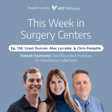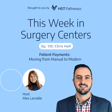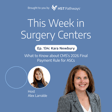
Marie Yarborough – Improving Patient Collections: Proven Strategies
Welcome to the third and final episode of our series on Improving Patient Collections! Over the past two episodes, we’ve explored mastering eligibility and shared valuable tips for post-date of service collections. Today, we’re excited to bring you insights from Marie Yarborough, the administrator at Sequoia Surgical Pavilion in Walnut Creek, California. With over 15 years of experience in healthcare administration, Marie has a wealth of knowledge when it comes to optimizing patient collections. In this episode, she’ll dive into key strategies for upfront collections, how third-party financing can help, the impact of the No Surprises Act, and how technology is transforming the process.
In our news recap, we’ll cover growing concerns from various ASC leaders, a new hospital price transparency bill that if passed will impact ASCs, Walmart’s new pharmacy delivery initiative, and, of course, end the news segment with a positive story about three nurses who went viral for their new CPR training technique.
Resources Mentioned:
ASCs sound alarm on mounting threats
New Hospital Price Transparency Bill in Pennsylvania Could Impact ASCs
Walmart adds pharmacy to same-day delivery
Texas Nurses Rock CPR: Using Sabrina Carpenter’s Hit to Save Lives
Brought to you by HST Pathways.



















